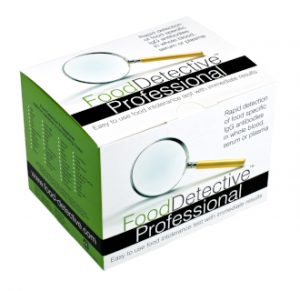Food Detective IgG Food Intolerance Test

Food Detective™ is a blood test for food antibodies (IgG) that can be conveniently used in the clinic of a health professional. You do not have to send off a sample and wait weeks to receive results from a testing laboratory. The testing tray that shows if the patient has IgG antibodies to specific foods has areas spotted with food protein extracts. A small blood sample is taken from a finger-prick and is then diluted and added to the tray. In subsequent steps the use of detector and developer solutions identify the presence of food antibodies through the appearance of one or more blue spots on the tray. Reference to the food layout plan enclosed within the instructions allows you to identify any foods to which the patient may have an intolerance.
Food Detective™ Has been designed for use by individuals and health practitioners. The test is safe and simple to use. The test takes 40 minutes to carry out and no specialist equipment is needed, everything is provided for you in the test kit. If after taking the Food Detective test you need help to read the results or you test positive for one or more foods, you can contact us for more help and advice.
Food Detective measures IgG antibodies which may be linked to inflammatory conditions in the body, manifesting in a range of health issues.
The reaction tray is spotted with food protein extracts. A small blood sample is taken from a finger-prick and is then diluted and added to the tray.
In subsequent steps the use of detector and developer solutions identifies the presence of food antibodies through the appearance of one or more blue spots on the tray. Reference to the food layout plan allows the foods causing antibody production to be identified. Once identified, the trigger foods may be eliminated from your diet.
Food Detective™ Food List
Cereals
Corn, Durum Wheat, Gluten, Oats, Rice, Rye, Wheat.
Nuts & Beans
Almond, Brazil Nut, Cashew, Cocoa Bean, Peanut, Legume Mix (pea, lentil, haricot), Soya Bean, Walnut.
Meats
Beef, Chicken, Lamb, Pork.
Fish
Freshwater Fish Mix (salmon, trout), Shellfish Mix (shrimp, prawn, crab, lobster, mussel), Tuna, White Fish Mix (haddock, cod, plaice)
Vegetables
Broccoli, Cabbage, Carrot, Celery, Cucumber, Leek, Peppers (red, green, yellow), Potato.
Fruits
Apple, Blackcurrant, Grapefruit, Melon Mix (cantaloupe, water melon), Olive, Orange & Lemon, Strawberry, Tomato
Other
Egg (whole), Cow’s Milk, Garlic, Ginger, Mushroom, Tea, Yeast.
What is Food Intolerance
It has long been known that the consumption of certain foods can have different effects on the physical and mental health of individuals.
Food intolerance is the body’s inability to properly digest certain types of foods, and symptoms are largely limited to the digestive tract. This can result in uncomfortable symptoms such as diarrhea, vomiting, abdominal bloating, cramping, and general gastrointestinal pain, but is typically not life-threatening. Food intolerance can be so mild that it even goes unnoticed, and it is believed that as much as 45% of people have some kind of food intolerance. Unfortunately, because these sensitivities are often undetected or tolerated, they can cause long-term damage that manifests later in life.
Food allergies, unlike food intolerance, are a strong reaction to specific types of food, and can result in a number of symptoms, ranging from mild to life-threatening. An allergic reaction can occur with even the slightest exposure to the food, such as eating a microscopic amount, touching the food, eating other food that was cooked in the same pan, etc. If you are having a strong reaction to food, this is likely an allergic reaction and you should seek medical attention immediately.
One of the problems with diagnosing food intolerance is that symptoms are often delayed. Symptoms can begin hours or even days after eating, making it hard to know what food caused a reaction. One way to figure out your food intolerance is by implementing an elimination diet, in which you start by removing some foods from your diet until your symptoms subside. Then, you slowly start to introduce these foods again, until one of them causes a reaction. Diagnostic tests which can guide you in this process are an excellent first step as they can make the whole procedure much easier by highlighting what to eliminate first. In cases of Food Intolerance your body reacts to the food by releasing certain antibodies. If your test shows an elevated level of antibodies to a specific food, it is suggested to remove that food from your diet for at least 3 months in order to completely eliminate it from your system. When the symptoms subside, the eliminated foods can be reintroduced one by one to monitor any reactions.
The best approach in investigating a Food Intolerance is to use a well known and established test which can detect all the relevant antibodies and display the results in a simple easy to read manner. While it is possible to test for a vast number of foods, food intolerance is typically triggered by the foods you commonly consume, focusing on this group will shorten the process and speed your way to recovery.
For over 10 years Food Detective™ has been the choice for testing of Food Intolerance in homes or in clinics. Utilizing only a small finger prick blood sample, the test provides visual results in less than 40 minutes and covers the majority of food items consumed in a common diet.
